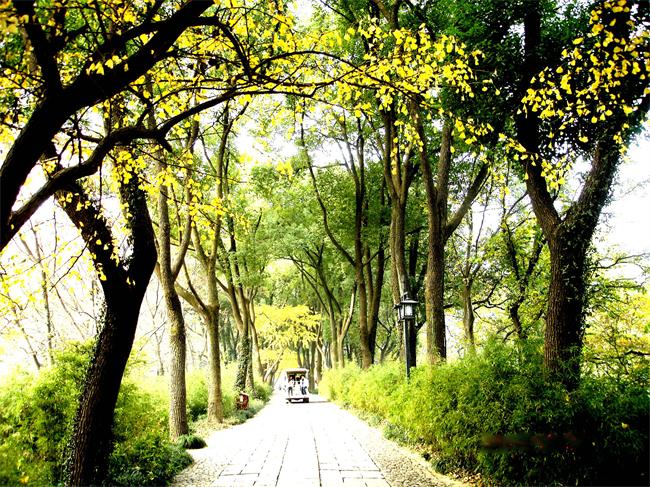Tiger Hill – temple fair and an ancient, leaning pagoda
 0 Comment(s)
0 Comment(s) Print
Print E-mail
Shanghai Daily, September 26, 2014
E-mail
Shanghai Daily, September 26, 2014

In three days, Tiger Hill in Suzhou will celebrate the 20th anniversary of its annual temple fair. One of the three major events at Tiger Hill, this year's fair lasts for 20 days, running through the week-long National Day holiday until October 19.
Suzhou has a long history of holding temple fairs at the mountain in autumn. In old times when people had little entertainment, the temple fair was a prime festive event where folks could unwind, celebrate the autumn harvest, satisfy their craving for delicacies and otherwise just have fun.
"For many Suzhou seniors, it's a must-have event," said Tan Qiuyi, head of the management office at Tiger Hill.
Standing in the northwest suburbs of Suzhou, Tiger Hill is a signature spot in the city that rises 36 meters. Built in AD 327, the Tiger Hill Temple is still prosperous today, though most of its buildings were destroyed long ago, leaving behind only the ancient pagoda. The pagoda's timber has been burned repeatedly by warfare and from lightning strikes, yet it still stands, albeit at a slant to the northeast. Therefore, it is also known as "China's Leaning Tower of Pisa."
Every year, the fair is held at the foot of where the old temple used to exist. Normally the fair would last for two months at most, but now it's shortened to three weeks due to budget considerations.
"The biggest challenge is to be creative and manage to attract the youngsters," said Tan, recalling the past 20 years. "We used to travel around the country to invite performers to the fair, such as stilt-walkers from Henan Province, drummers from Shanxi and acrobats from Wuqiao, Hebei."
But for years the ticket revenue failed to cover the expenses to invite performing troupes. So the office decided to scale back the events and concentrate on the display of local folk arts. A parade with dancing lions and dragons will tour around the hill daily (but not during National Day holiday). Apart from regular musical and acrobatics shows, an array of stalls selling local snacks and cuisines will line outside the west end of Duanliang Pavilion.
"This year's fair will offer visitors outside Suzhou a taste of authentic Suzhou culture and a chance for young people to get immersed in local arts and tradition, and at the same time will entertain local seniors with remembrances of the good old days," Tan said.
After the fair, head east along Hill Ring Road to Wanjing Manor, which houses more than 600 miniature trees in tray scenery, or penjing in Chinese.
Widely known as bonsai in Japanese, the art of miniature trees and rockery originated in China. The techniques of making tray scenery and its arrangement styles vary around the country. In Suzhou, the penjing are miniatures of Suzhou garden art.
"Many Westerners don't like penjing because they think the natural growing process of plants is hindered and they are made into a composition by being cruelly tied or bound up. But Chinese see the power of life and the beauty of rebirth since all the plants in tray scenery grow on the dead gnarled tree stools," said my tour guide surnamed Yan. "Through the miniature scenery, Chinese see the passing of time, changing of seasons and cycle of life and death."
Tour guides at Tiger Hill are highly recommended, especially if you plan to visit the tray scenery manor. The well-learned, English-speaking ladies can give you a better idea about the art and its techniques. Visitors can even try their hand at arranging simple tray sceneries if they book ahead.
Admission: 80 yuan
Tel: 0512-6723-2305, 0512-6532-3488
Opening hours: 7am-5:30pm
Address: Jinchang District, Tiger Hill Scenic Area






